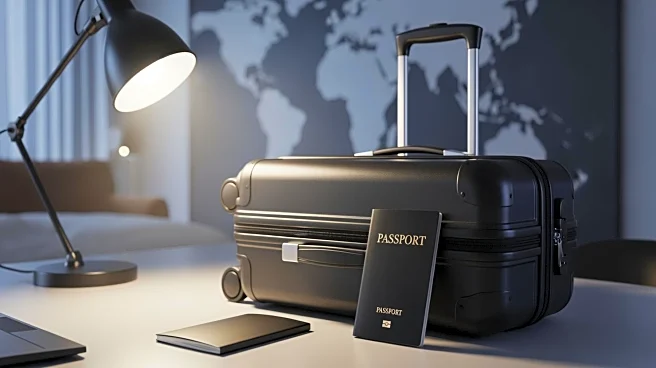What's Happening?
Bleisure travel, which combines business and leisure, is increasingly popular among U.S. business travelers. According to a survey by Uber and the Global Business Travel Association (GBTA), 90% of corporate
travel managers in the U.S. and Canada report that employees are as interested, if not more, in bleisure travel compared to pre-pandemic times. This trend is reflected in the fact that 81% of business travelers are already incorporating leisure activities into their work trips. In 2022, bleisure travel accounted for over a third of all trips, with travelers extending their stays by an average of 4.5 days to enjoy their destinations. Women are leading the charge in adding leisure to their business trips, despite men being more likely to travel for business. The trend is driven by the normalization of remote work and flexible corporate policies, allowing employees to extend work trips for personal vacations.
Why It's Important?
The rise of bleisure travel has significant implications for the travel industry and corporate policies. It encourages companies to adapt by offering flexible travel arrangements and promoting a positive work-life balance. Businesses benefit from employees who return from trips feeling refreshed and more productive, which can enhance overall company culture and employee satisfaction. The trend also impacts the hospitality industry, prompting hotels to offer amenities and loyalty programs that cater to bleisure travelers. As more companies embrace this trend, it could lead to a shift in how business travel is perceived, with a greater emphasis on personal well-being and work-life integration.
What's Next?
As bleisure travel continues to grow, companies may further adapt their travel policies to accommodate this trend. This could include offering discounted rates for extended stays, encouraging loyalty program enrollment, and providing amenities that appeal to both business and leisure travelers. The hospitality industry is likely to see increased demand for hotels that can cater to bleisure needs, potentially leading to new room types and services designed for longer stays. Additionally, the trend may influence corporate travel budgets and strategies, as companies seek to balance cost-effectiveness with employee satisfaction.
Beyond the Headlines
The rise of bleisure travel reflects broader cultural shifts towards valuing work-life balance and personal fulfillment. It highlights the changing nature of work, where remote and flexible arrangements are becoming more common. This trend may also have ethical implications, as companies consider the environmental impact of increased travel and seek sustainable solutions. Furthermore, bleisure travel could influence societal norms around vacation time and work commitments, potentially leading to a reevaluation of traditional work structures.











